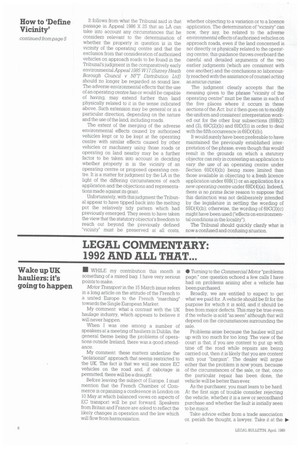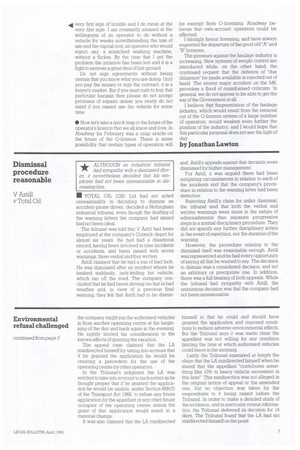LEGAL COMMENTARY: 1992 AND ALL THAT...
Page 112

Page 113

If you've noticed an error in this article please click here to report it so we can fix it.
Wake up UK hauliers: it's going to happen
III WHILE my contribution this month is something of a mixed bag. 1 have very serious points to make.
Motor Transport in the 15 March issue refers in a long article on the attitude of the French to a united Europe to the French "marching" towards the Single European Market.
My comment what a contrast with the UK haulage industry, which appears to believe it will never happen.
When I was one among a number of speakers at a meeting of hauliers in Dublin, the general theme being the problems of operations outside Ireland, there was a good attendance.
My comment these matters underline the "isolationist" approach that seems restricted to the UK. The fact is that we will see more EC vehicles on the road and, if cabotage is permitted, there will be a draught.
Before leaving the subject of Europe. I must mention that the French Chamber of Commerce is organising a conference in London on 10 May at which balanced views on aspects of EC transport will be put forward. Speakers from Britain and France are asked to reflect the likely changes in operation and the law which will flow from harmonisation.
• Turning to the Commercial Motor "problems page," one question echoed a few calls I have had on problems arising after a vehicle has been purchased.
Broadly, we are entitled to expect to get what we paid for. A vehicle should be fit for the purpose for which it is sold, and it should be free from major defects. This may be true even if the vehicle is sold as seen" although that will depend on the circumstances surrounding the sale.
Problems arise because the haulier will put up with too much for too long. The view of the court is that, if you are content to put up with time off the road while repairs are being c-arried out, then it is likely that you are content with your "bargain". The dealer will argue either that the problem is now yours, because of the circumstances of the sale, or that, once the particular repair has been done, the vehicle will be better than ever.
As the purchaser, you must learn to be hard. At the first sign of trouble consider rejecting the vehicle, whether it is a new or secondhand purchase and whether the fault is initially seen to be major.
Take advice either from a trade association or, perish the thought, a lawyer. Take it at the
very first sign of trouble and I do mean at the very first sign. I am constantly amazed at the willingness of an operator to do without a vehicle for weeks notwithstanding the loss of use and the capital cost; an operator who would reject, say. a scratched washing machine, without a flicker. By the time that I get the problem the initiative has been lost and it is a fight to recover a great deal of lost ground.
Do not sign agreements without being certain that you know what you are doing, Until you pay the money or sign the contract, it is a buyer's market. But if you must rush to buy that particular bargain then please do not accept promises of repairs unless you really do not mind if you cannot use the vehicle for some time.
• Now let's take a quick leap to the future of the operator's licence that we all know and love. In Roadway for February was a crisp article on the future of the 0-licence, There is some possibility that certain types of operation will be exempt from 0-licensing. Roadway believes that own-account operators could be affected.
I strongly favour licensing, and have always regretted the departure of the good old "A" and "B" licences.
The pressure against the haulage industry is increasing. New systems of weight control are introduced while, on the other hand, the continued request that the defence of "due diligence" be made available is rejected out of hand. The recent major accident on the M6, provokes a flood of misinformed criticism. In general, we do not appear to be able to get the ear of the Government at all.
I believe that fragmentation of the haulage industry, which would result from the removal out of the 0-licence system of a large number of operators, would weaken even further the position of the industry, and I would hope that this particular proposal does not see the light of day.
by Jonathan Lawton
















































































































































